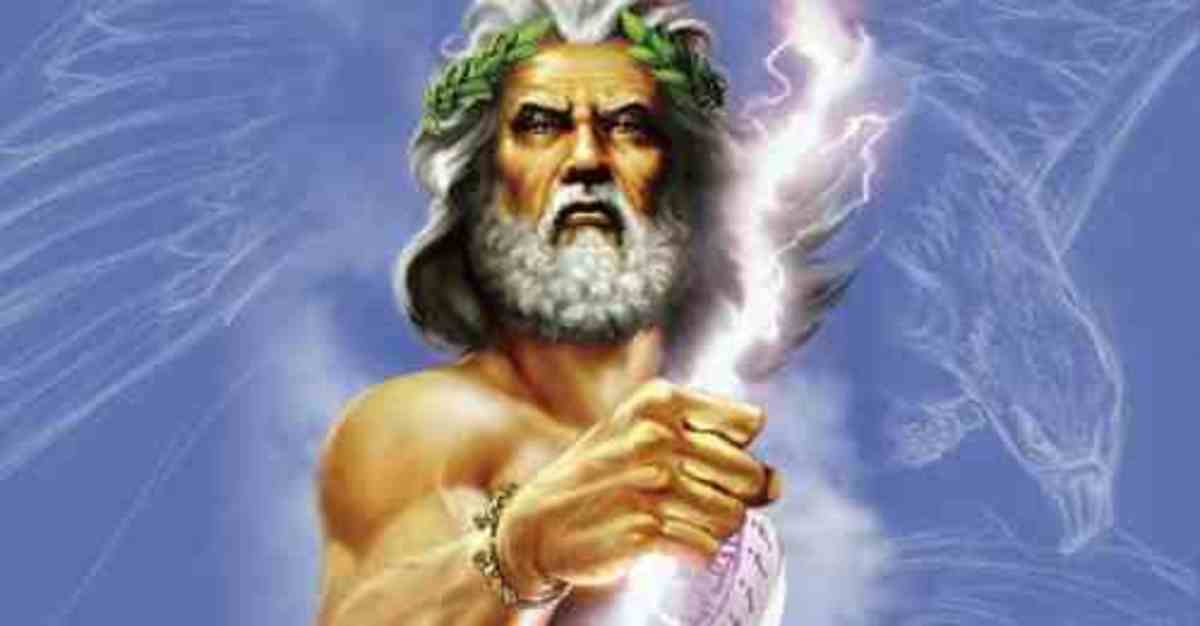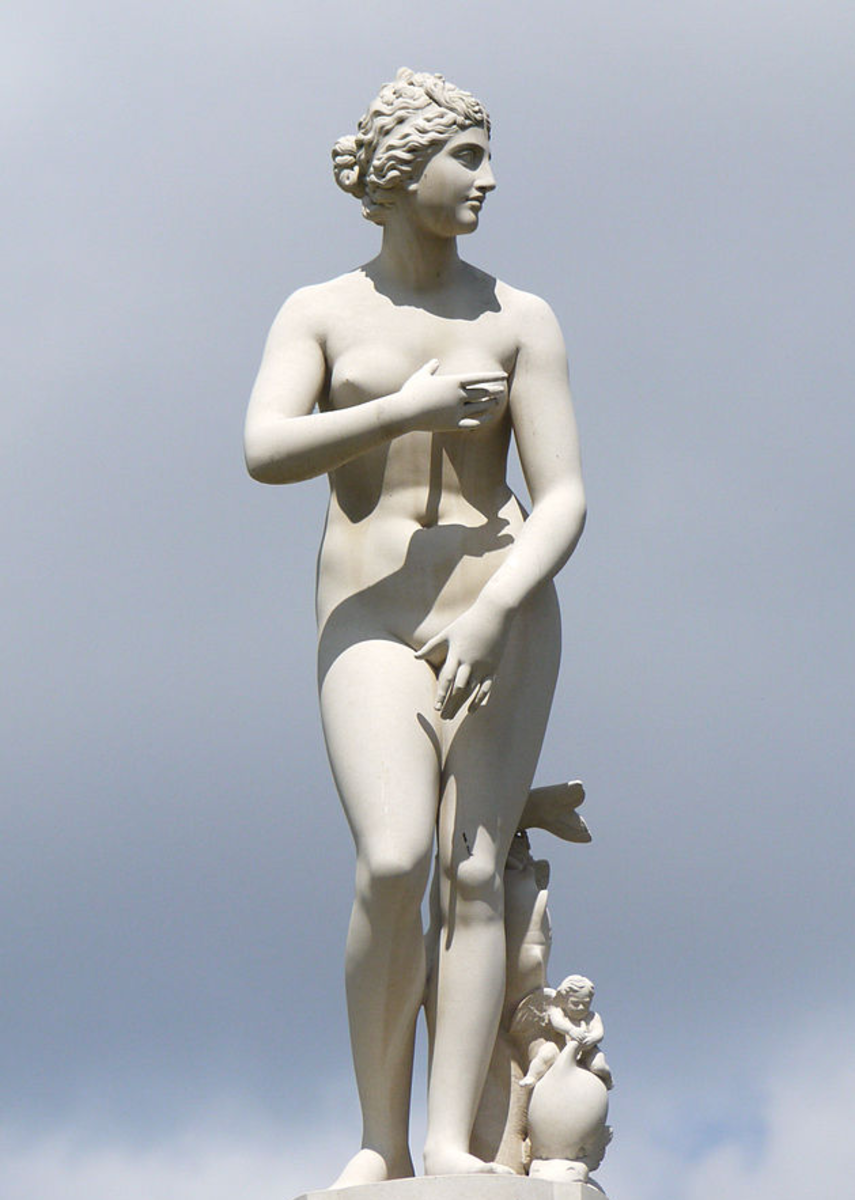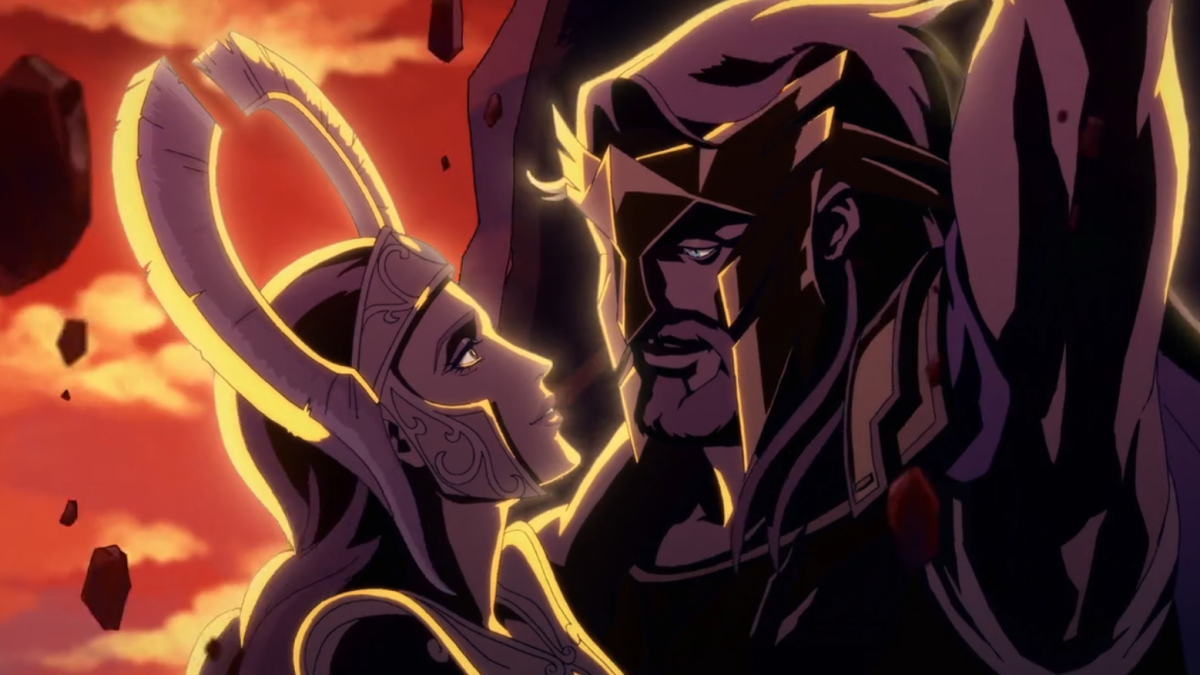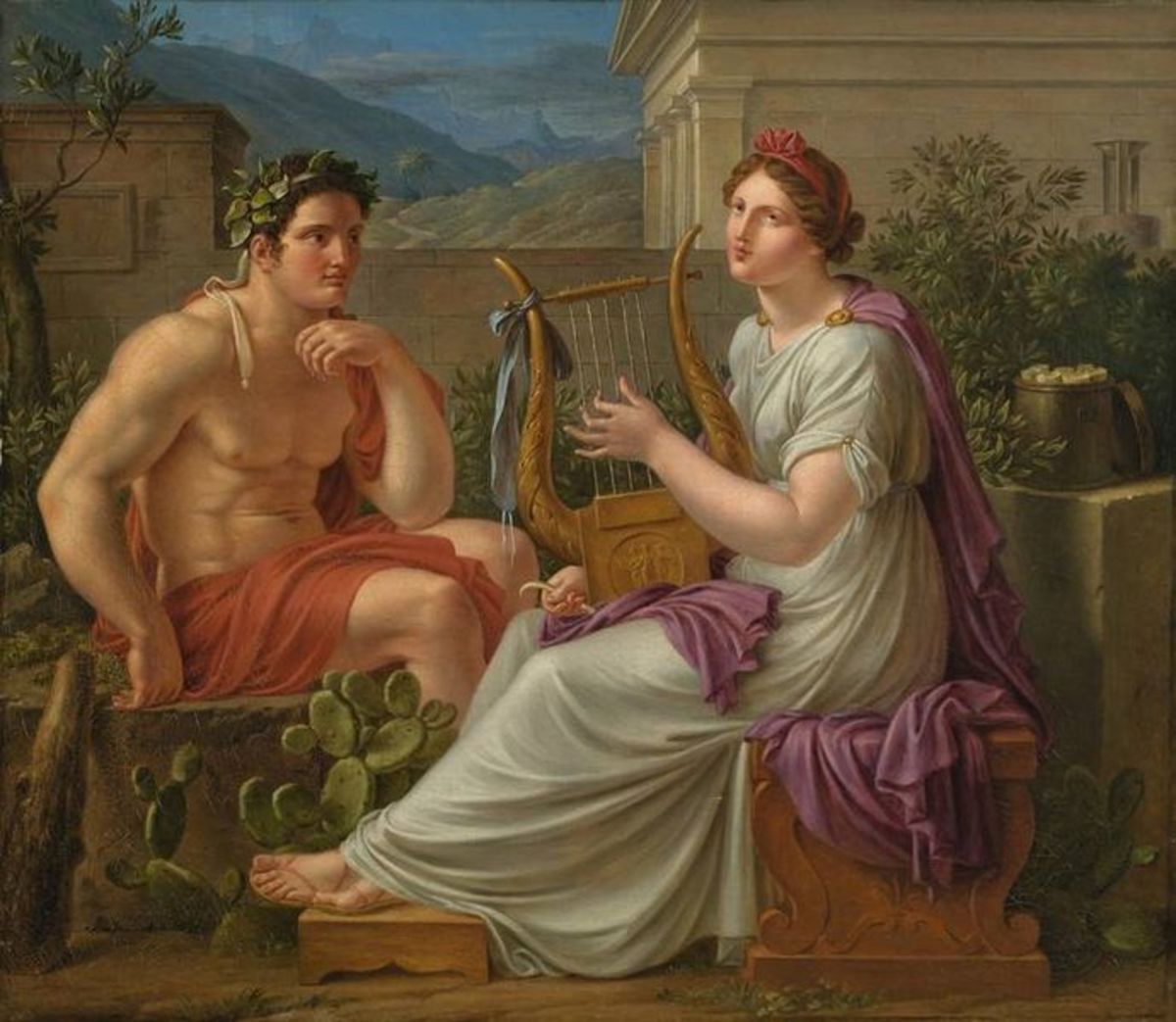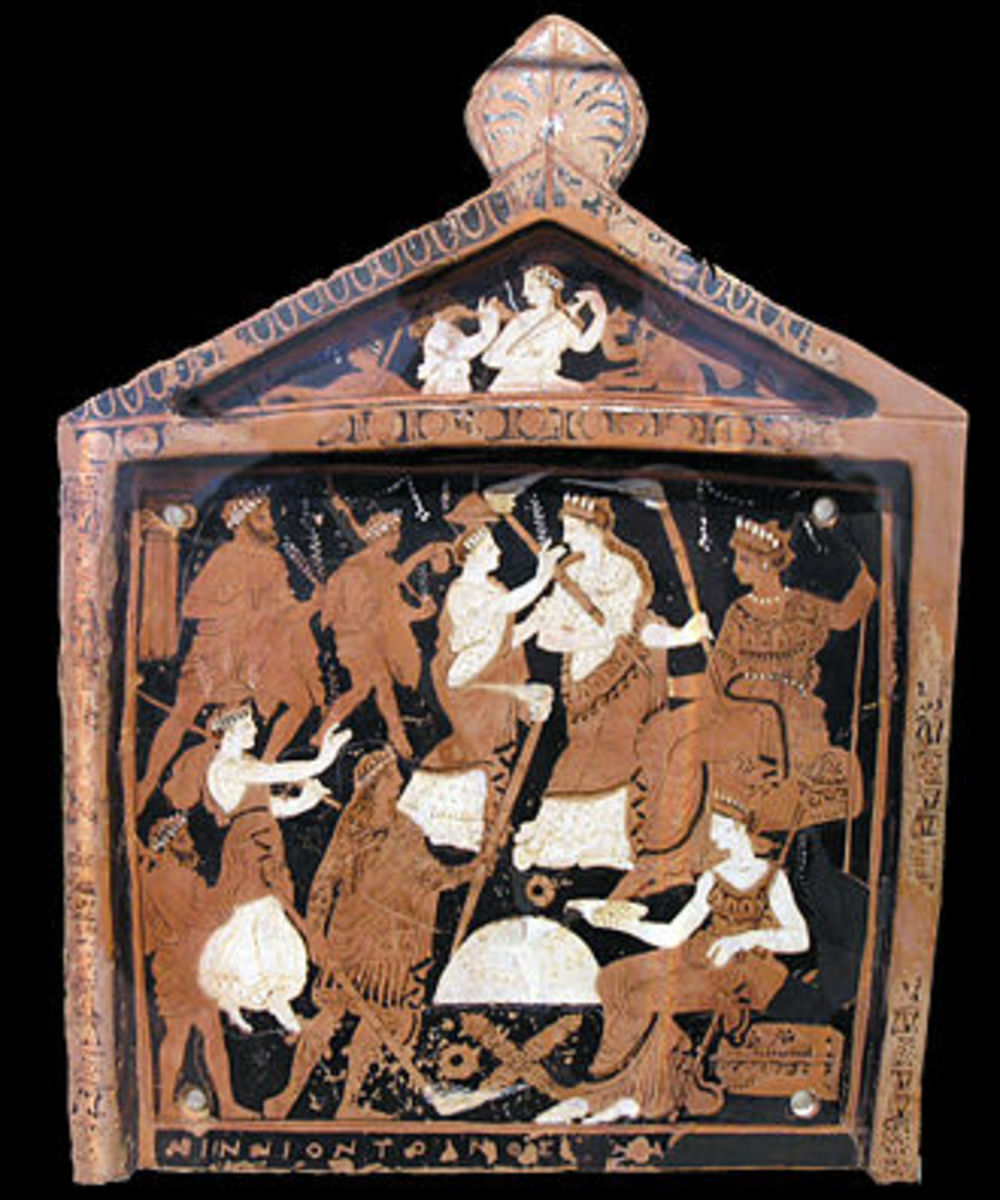- HubPages»
- Education and Science»
- History & Archaeology»
- Ancient History»
- Greek & Roman History
From the Greek That'll Learn Ya File: King Tantalus - Watch What You Serve Your Family
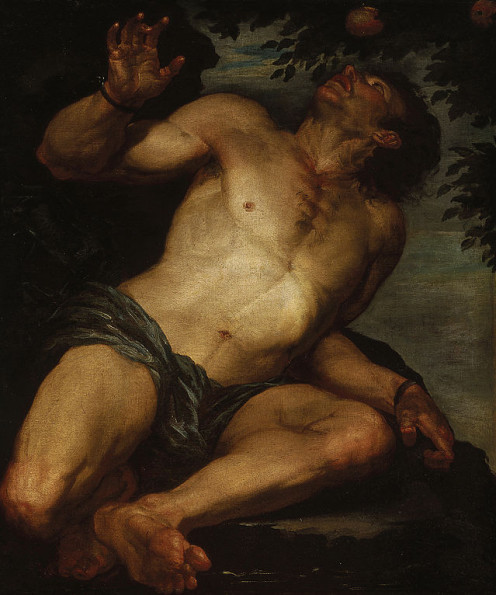
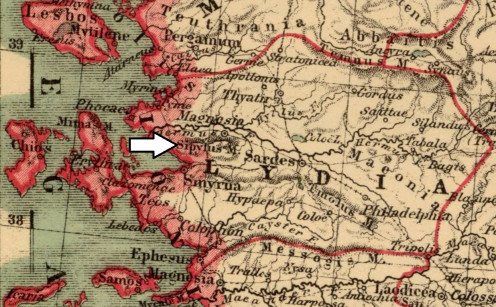
King of Sipylus
In the city of Sipylus in western Anatolia, modern day Turkey, there was a very rich king named Tantalus. While his riches were directly related to gold mines located near his city, it was no less important that his father was Zeus, King of the Gods, and his mother was a nymph named Plouto. Plouto was the daughter of the sea Titans Oceanus and Tethys, and she was the goddess of wealth. Both her name and title would later be given to Hades by the Romans.
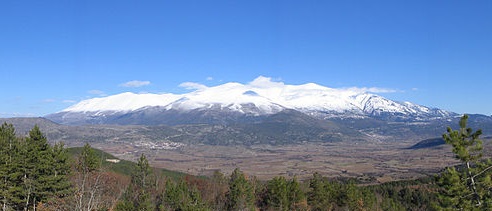
The king had three children, sons Broteas and Pelops and a daughter Niobe, with his wife Dione, who was herself the daughter of the Titan Atlas. Zeus rarely had contact with his mortal children, though given Tantalus's parentage, both being gods, he should have been immortal himself, but he dearly loved his son Tantalus and often had him visiting Mount Olympus. On one occasion, however, Tantalus did something that would get him banned from Olympus forever. The king stole nectar and ambrosia, the food and drink of the gods, and took it back to Sipylus. Tantalus gave the food of the gods to his subjects as proof that he was the son of Zeus and welcome at his father's table. Despite the fact that he deserved much worse punishment than being banned from his father's home on the mountain of the gods, Tantalus was very angry with his father over his banishment and devised a plan to get even with all of the Olympians. His ill-fated revenge would curse not only Tantalus but all of his children as well.
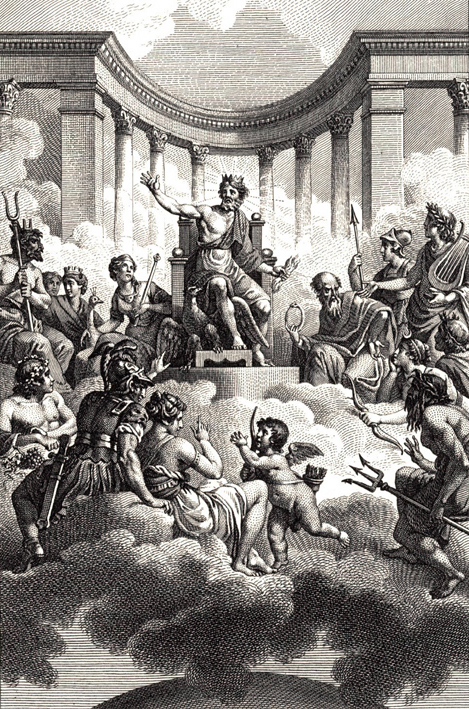
Dinner for the Gods
Tantalus decided to invite the twelve Olympians to dinner in his home. The Olympians were Zeus, Hera the Queen of the Gods, Poseidon god of the sea, Aphrodite goddess of love, Demeter goddess of the harvest, Athena goddess of wisdom, Hephaestus god of fire, Ares god of war, Apollo god of the sun, Artemis goddess of the moon, Hermes god of travelers and Dionysus god of wine. Once the gods and goddesses all confirmed their invitations, Tantalus set about creating a magnificent feast. The main course would be a stew made from the body of his son Pelops.
The king went about the work of cutting his boy into pieces and boiling him in a pot. As the gods began to arrive, Tantalus kept his secret ingredient quiet and placed the Olympians around the table. The king, however, had not taken into account that the gods were capable of seeing what he was doing even when they were not present. As the stew was served up into bowls, the gods watched in shock. They could not believe that Tantalus had killed his son for this purpose or that he had the nerve to serve him to them at his table. There was one exception however.
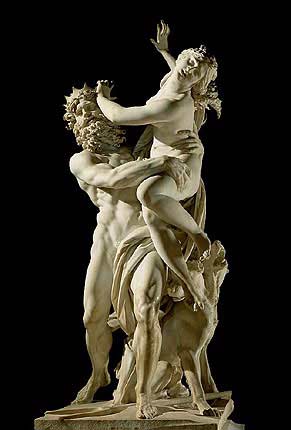
The goddess Demeter, though she was present at the dinner, was under extreme duress. Her beautiful teenage daughter, Persephone, had recently been kidnapped, and though she had looked high and low, she had not yet found her. The goddess was so lost in her grief that she absently ate from her bowl and consumed the left shoulder of the boy without realizing.
Zeus was so distraught over what his son had done, he ordered one of his daughters, Clotho, one of the Fates, to put the body of Pelops back together and bring him back to life. To remedy the missing left shoulder, Hephaestus created a replacement out of ivory. He then gave the shoulder to Demeter and had her present it to Clotho since she was the one who ate the real one. Zeus then struck down his son, Tantalus, and sent him to Tartarus, the lowest level of the Underworld, where he would face eternal torment.
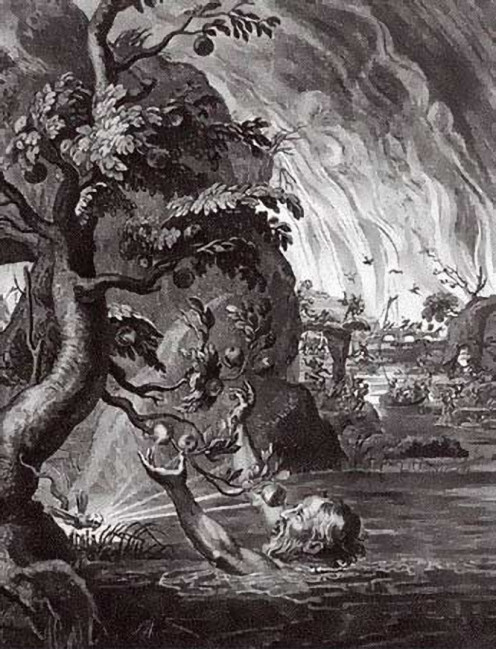
The Punishment of Tantalus
Because the sin of Tantalus involved feeding his own child to the gods, his eternal punishment was to never again be able to eat or drink. The king was placed in a stream under a fruit tree. If Tantalus reached for a piece of fruit from the tree, the branch would rise to the point where the king could not reach it. If he tried to take a drink of water, the stream would flow away from him. His desires would be in front of him but always just out of his reach. He would be tantalized for eternity which is where the word originates.
The children of Tantalus were not immediately punished for their father's actions, but each of them and their future generation all suffered tragedies. Whether they were cursed for Tantalus's act or just inherited his hubris, extreme pride or self-confidence, all three children of the king would suffer.
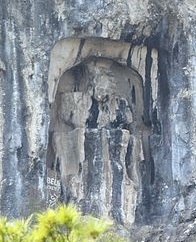
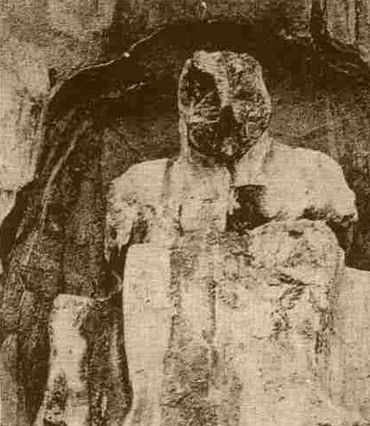
Broteas Goes Up in Flames
Tantalus's son Broteas was a famed hunter and master sculptor. He had one son named after his father Tantalus. His most prestigious piece of sculpture is a statue of his great grandmother Rhea, known as Cybele to the Hittites who later settled in the area. While the statue has suffered great wear in the thousands of years since it was carved, it can still be seen today.
As for is hunting ability, everyone agreed that Broteas was a masterful hunter, but in his arrogance he refused to give any credit to the goddess of the hunt, Artemis. Artemis would gain a reputation for not taking too kindly to hunters that did not sacrifice to her. Broteas's great nephew, Agamemnon, would later learn this same lesson during the lead up to the Trojan War.
Artemis drove Broteas to madness for refusing to honor her. He became so insane that he believed he was immune to fire. The goddess, wanting to show him the error of his thinking, drove him to set himself on fire. He was consumed by the flames.
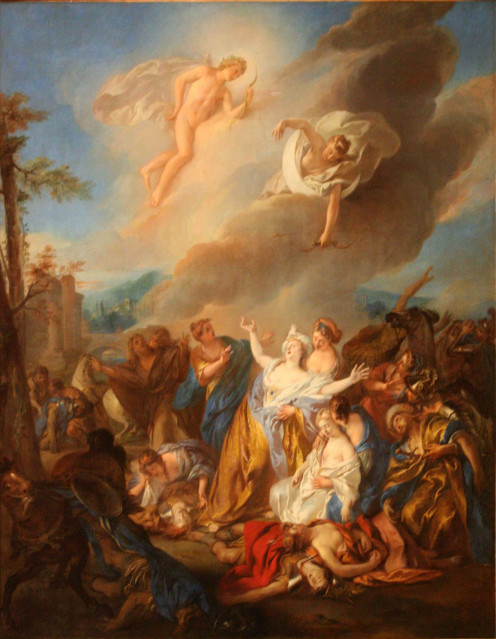

Niobe Cries Herself to Death
Niobe, the daughter of Tantalus and Dione by all accounts was having a wonderful life. She was married Amphion, who founded the city of Thebes with his twin brother Zethus. The two were sons of Zeus and Antiope, the daughter of a Boeotian river god. (Yes, Zeus did truly get around.) Together Niobe and Amphion had fourteen wonderful and loving children, seven glorious sons and seven beautiful daughters. In fact, Niobe was so proud of her children that she as their mother, placed herself on a pedestal higher than Leto, the mother of Apollo and Artemis.
During a celebration to honor the mother of the twin archers and Olympians, which Leto herself demanded of the women of Thebes, Niobe claimed that she was more beautiful than the blonde Titaness, she had better parentage, although being the daughter of Tantalus and a nymph hardly seems better than two Titans. Niobe also claimed that having fourteen children was far better than only having a set of twins even if they were Olympians. Leto was so irate, that she called upon her children to punish Niobe for her hubris.
Artemis and Apollo swiftly too revenge on Niobe's children with Apollo killing all of her sons as Artemis killed all of her daughters. Niobe's grief was compounded by the death of her husband who was killed by Zeus when he threatened to take revenge on the twins. Niobe returned to Sipylus, the city of her birth, and prayed to be spared from the heartbreak. She was turned to stone, though her tears continued to flow from the rock.
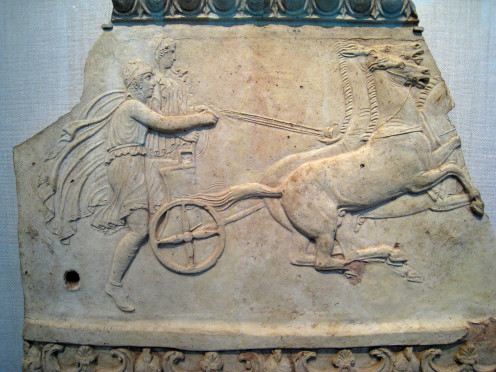
Pelops a Life of Curses
Pelops lived a life full of ups and downs. Despite being killed by his father and feed to the gods, once he was resurrected from the pot of stew, he was taken to Olympus and raised by the gods, which was quite a feat seeing how the gods never raised any of their own children. His great uncle Poseidon even taught him the art of driving chariots. Once he was grown, however, his grandfather Zeus put him out of Olympus just to ensure that he did not try anything like stealing nectar and ambrosia.
Now that he was once again among the mortals, Pelops, who had become extremely handsome, met and fell in love with Hippodamia. There was just one little problem, she was the daughter of King Oenomaus, and he had received a prophecy that he would be killed by his son-in-law. Not wanting this to happen, the king forced every suitor for his daughter's hand beat him in a chariot race. Of the nearly twenty men who sought to marry Hippodamia, thirteen of them died racing against her father. Pelops accepted the challenge, but despite his training as a boy, he called upon Poseidon to help him win. Poseidon presented Pelops with a chariot pulled by two pegasi. Pelops went even further to ensure his victory. He went to Myrtilus, the chariot driver of Oenomaus. Myrtilus just happened to be the son of Hermes and agreed to a plan with a fellow demigod. The plan was to have Myrtilus sabotage the king's chariot before the race. In return, Pelops would give Myrtilus half of the king's kingdom and let him sleep with Hippodamia on their wedding night before he did. Myrtilus did his part by replacing the axle with beeswax. Pelops quickly took the lead, but just as Oenomaus was about to catch him, the wheels fell off of his chariot. Myrtilus, knowing it would happen, jumped to safety, but the king was dragged to his death. Afterward, when Myrtilus attempted to collect on his one night with Hippodamia, Pelops threw him from a cliff. On his way to the sea below, Hermes's son cursed Pelops. It most likely did not help that Oenomaus was the son of Ares, the god of war.
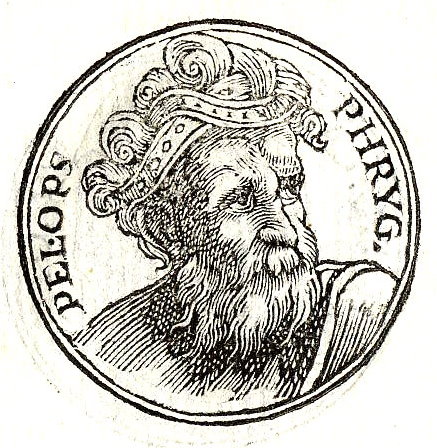
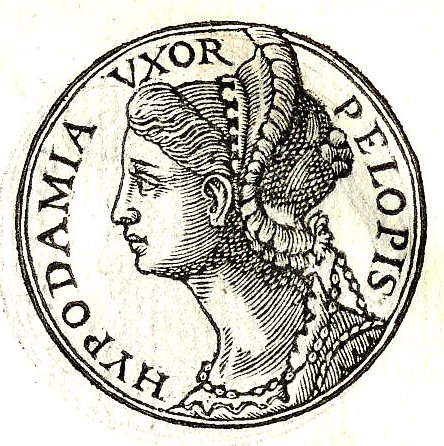
Pelops and Hippodamia were now the rulers of her father's kingdom, Pisa. Under their rule, the kingdom would become the site of the Olympic Games as athletics were important to the king. The king and queen had many children, though the total count varies. They included Pittheus who would become the grandfather of Theseus; Dimoetes who would eventually die from grief over his love for the corpse of a woman who washed up on his shores; Copreus who was the herald of the king who assigned the Twelve Labors to Heracles; Hippalmus was one of the Argonauts who sailed with Jason; Nicippe whose husband was the son of Perseus and Andromeda; Astydameia who married Alcaeus and through their son Amphitryon became a step-grandmother of Heracles; Eurydice who became the mother of Alcmena and thus the grandmother of Heracles; and Atreus and Thyestes their twin sons who furthered the curse of the family.
Pelops also had a son, named Chrysippus, by the nymph Axioche. Chrysippus was the joy of Pelop's life. Which of course did not please his wife Hippodamia. She became afraid that Pelops would leave the kingdom that had once been her father's to his bastard son, so she hatched a plan that involved her twins Atreus and Thyestes. Before I get into the trouble Chrysippus ran into with his half brothers, however, it should be noted that he had already suffered a horrifying incident in his life.
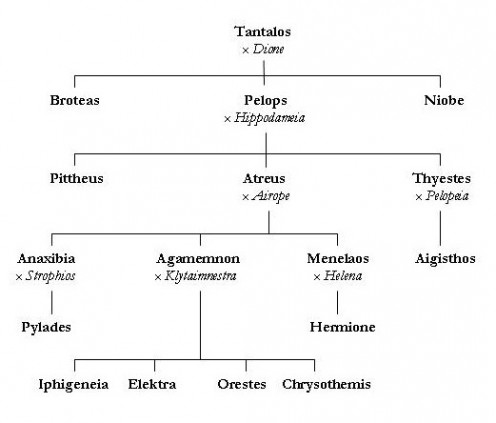
Chrysippus was a beautiful boy and excelled in athletics. He was sent to represent his father in the Nemean Games, a preliminary event to the Olympics. He was kidnapped, however, by Laius, a prince of Thebes, who forced him to become his lover. The event started a war between Pisa and Thebes. The gods, angered by the event, punished the kidnapper and his family after the return of Chrysippus to his father. After his safe return to Pisa, Chrysippus was lead to a well by his brothers, Atreus and Thyestes, and upon orders from their mother, pushed the boy in where he drowned. When learning of his son's death, Pelops cast his twins and their mother out of Pisa. The three fled to Mycenae where Hippodamia killed herself.
After the suicide of their mother, Atreus and Thyestes became stewards to the throne of King Eurystheus when he left to fight the sons of Heracles in Athens. Unfortunately for the king, Heracles's sons were quite upset at what he put their father through, the Twelve Labors, while in cahoots with Hera. They killed him during the battle and the sons of Pelops became the permanent rulers of Mycenae.
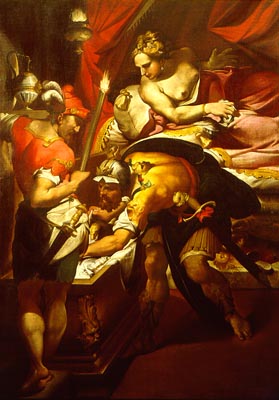
The problem with committing a violent crime with your twin brother is that neither of you can be trusted. Atreus took the throne of Mycenae and promised to sacrifice his best lamb to Artemis. He found a golden lamb in his flock, and most would think this surely was his best. Instead of sacrificing it to Artemis however, he gave it to his wife, Aerope, to hide, so Artemis would not know about it. Aerope gave the treasure to her lover, you guessed it, Thyestes. Thyestes then went to his brother and proposed that whoever had the lamb should be king. Atreus, assuming Aerope still had it, agreed. He was dumbfounded when his brother brought out the lamb and took the throne. Atreus, having been tricked out of his kingdom, called upon Hermes, god of thieves and tricksters, for help taking it back. Hermes suggested he make a bet with his brother they he would get the throne when the sun moved backwards across the sky. A feat easily accomplished by Zeus, most likely with the help of Apollo. Not willing to continue this back and forth fight for the throne, once Atreus took it back from his brother, he banned Thyestes from the kingdom. Not long after kicking his brother out of Mycenae, Atreus found out about his wife and brother's affair. In order to get back at his brother, he barrowed a play from his dear old grandfather's playbook. He killed Thyestes's sons, cut them up and cooked all but the hands and feet in a stew. He then served the stew to his brother and threw the hands and feet into his face.
Thyestes was now determined to take care of his brother once and for all. He sought advice from an oracle who told him that if he had a son by his own daughter, Pelopia, that the boy would kill Atreus. Thyestes then proceeded to rape his daughter. Pelopia was so embarrassed by the rape that she abandoned the baby, Aegisthus, in the woods. A shepherd found the baby and gave him to the king, Atreus, to raised the boy like his own right along with his biological sons, Menelaus and Agamemnon. When Aegisthus grew up, Thyestes told the young man who he really was, that Thyestes was both his father and grandfather. He convinced the boy to do his bidding and had him kill Atreus. Thyestes then once again became king of Mycenae causing Menelaus and Agamemnon to flee to Sparta. The king of Sparta, Tyndareus, took the boys in and agreed to help them overthrow Thyestes to recover the throne of Mycenae. Instead of killing their uncle, the boys exiled him the Cytheria. Agamemnon then took the throne of Mycenae along with King Tyndareus's daughter Clytemnestra as his wife. Menelaus married Tyndareus's daughter Helen (who was really a daughter of Zeus) and was given the throne of Sparta.
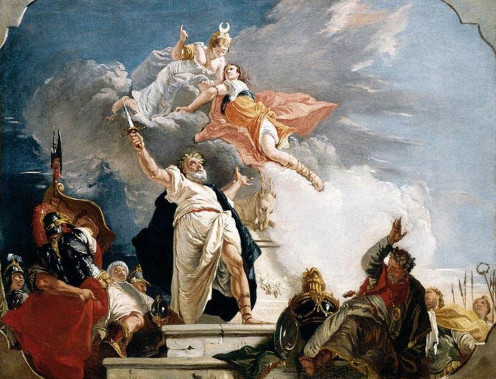
What happened next was this little thing called the Trojan War. It occurred when Aphrodite gave Paris, a prince of Troy, Helen's hand in return for his judging her the most beautiful goddess, but it is a long story. (See http://anitajsmith.hubpages.com/hub/The-Trojan-War-All-From-a-Single-Apple for the entire story)
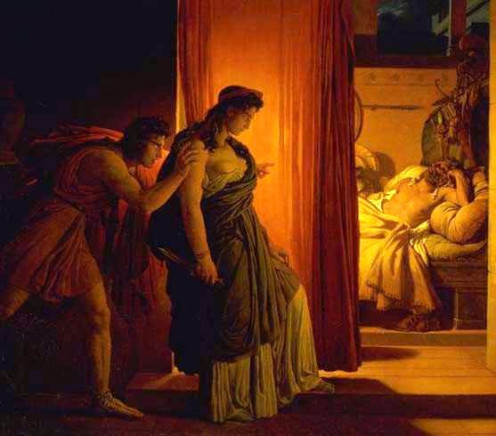
The hardship of Agamemnon did not stop with the Trojan War, however. Though victorious in defeating the Trojan after ten years of war, Agamemnon returned home to his kingdom only to be murdered by his loving wife, Clytemnestra, and her lover, Aegisthus. Clytemnestra claimed revenge of her daughter's, Iphigenia, sacrifice to Artemis who was holding the winds captive and preventing the Greek ships from sailing to Troy. A punishment the goddess put in place because Agamemnon bragged about his hunting skills and refused to give her any credit for it, sounds familiar. Little did Clytemnestra know that Artemis had actually spared her daughter before the sacrifice could take place.
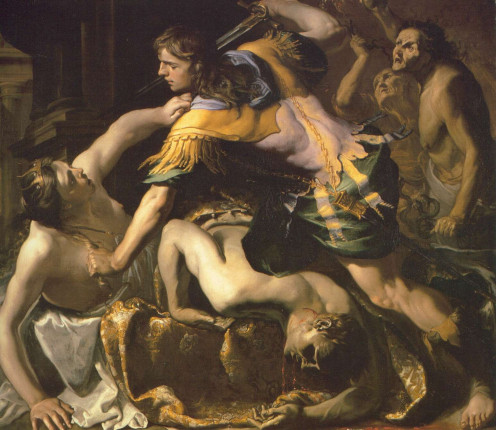
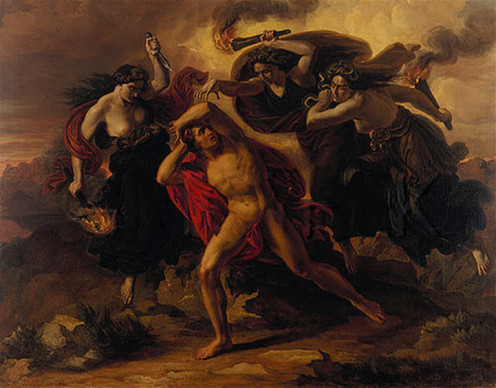
Was this enough pain and suffering to break the curse? Not quite. Orestes, the son of Agamemnon and Clytemnestra, was in Athens when his mother killed his father. He sought advice from the Oracle of Delphi and was told to avenge his father's death. He took his sister Electra back to Mycenae and together they killed their mother, Clytemnestra and stepfather, Aegisthus. As Clytemnestra lie dying, she cursed her son to the fate of the Furies for killing his own mother. Orestes returned to the Oracle of Delphi chased by the Furies. He was on the brink of madness when he arrived bloodied by the razor sharp talons of the avengers. The oracle sent him to Athens to the council of the goddess Athena. Once there, she arranged a trial for the murders. The trial took place on the Acropolis. The Furies demanded that he be turned over to them and suffer the penalty of death. Orestes claimed that he was only following the orders of Apollo, since it was his oracle that told him to do it. The twelve judges voted six to six resulting in a hung jury. Athena became the deciding voice and chose to acquit Orestes.
The curse was now over after generations of tragedy. Some say that Orestes went on to become the king of Mycenae. Others say he was reunited with his sister Iphigenia. From Tantalus betraying his father Zeus through Orestes avenging his father's death, there was infanticide, a couple of cases of cannibalism, incestuous rape, adultery, and a whole bunch of murder. Once can hope that this was just a story to prevent the ancient Greeks from acting this way, but with the location of tombs belonging to those involved, one is left to wonder.







